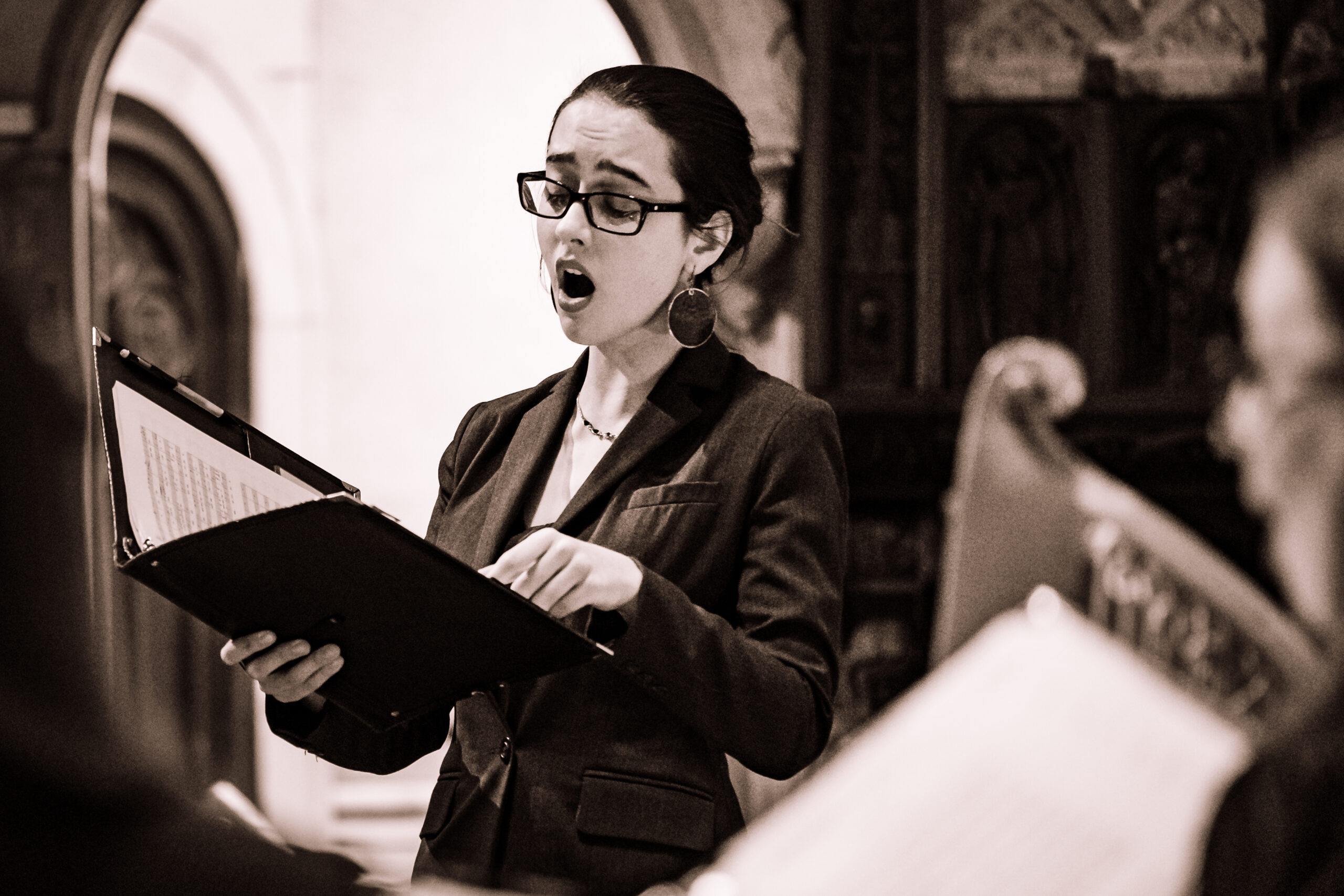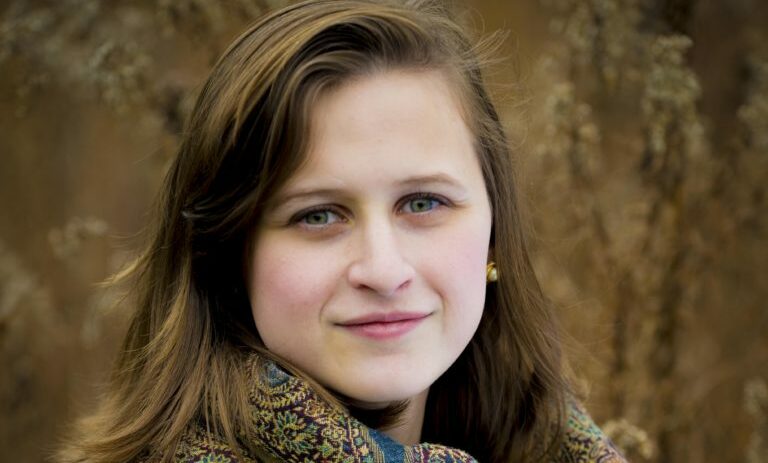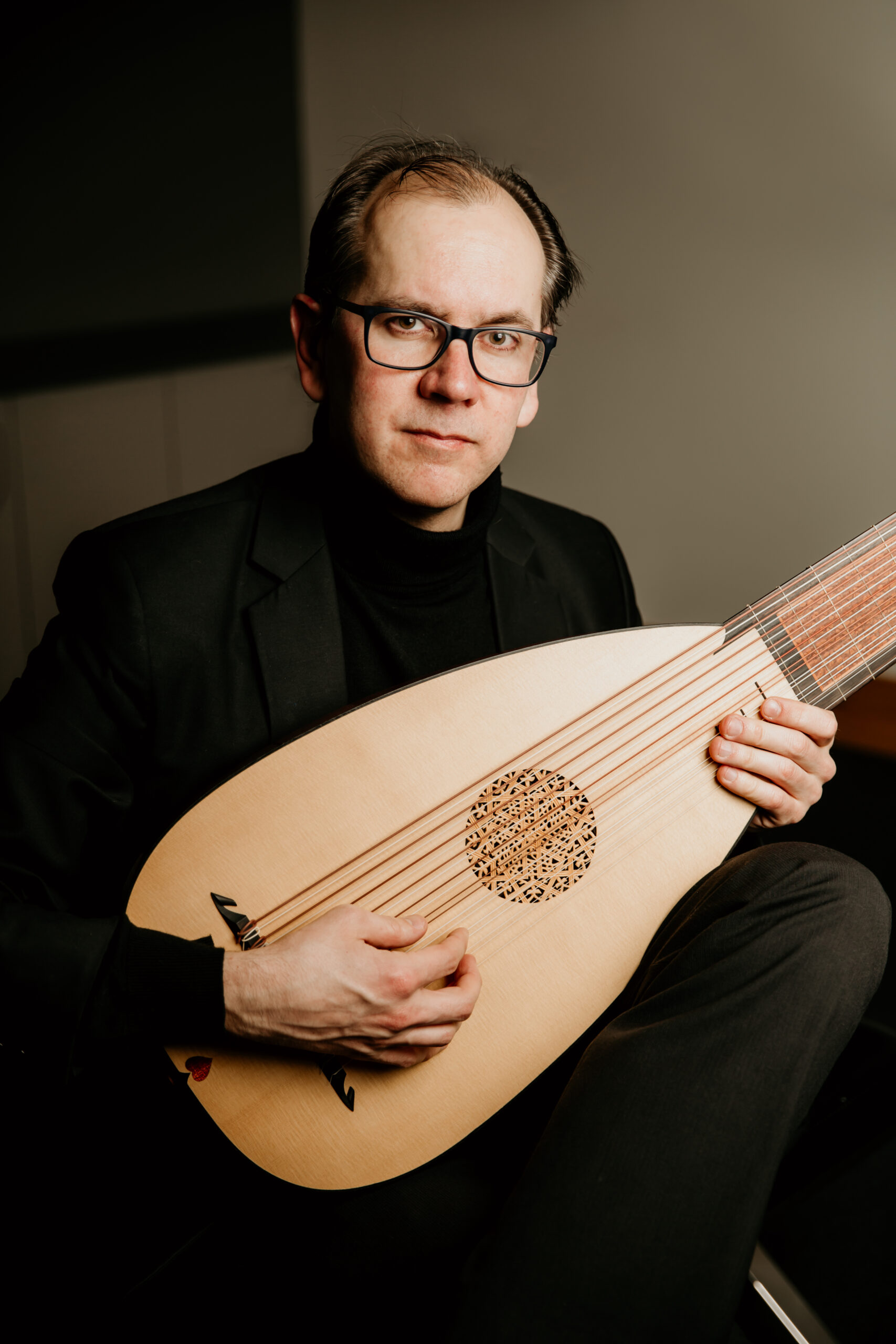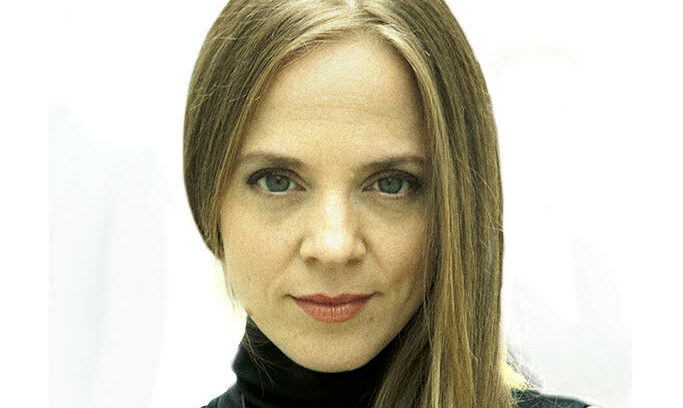Online I Ariadne Lih, Myriam LeBlanc & Suzie LeBlanc, sopranos I Lucas Harris, lute & director
Suzie LeBlanc, Soprano; Myriam Leblanc, Soprano; Ariadne Lih, Soprano; Bronwyn Thies-Thompson, Soprano; Lucas Harris, Therobo; Antoine Malette-Chénier, Baroque Triple Harp; Dorothéa Ventura, Chamber Organ & Soprano
Chiara Margarita Cozzolani has been steadily receiving recognition in recent decades as one of the most skillful and expressive of a handful of published nun composers from seventeenth-century Italy. She took her vows at age 18, adopting “Chiara” as her religious name as she entered the Benedictine monastery of Santa Radegonda, where she would serve as maestra di cappella, abbess, and prioress.
This programme focuses on her 1648 collection of twelve motets for solo soprano, Scherzi di sacra melodia. No copy of the accompanying basso continuo partbook has been found, making the collection inaccessible to performers until now. The bass part for three of the motets was composed from scratch by lutenist Lucas Harris. The concert ends with Non tema nò di morte, a trio from the sole surviving collection of another Italian nun composer, Maria Francesca Nascinbeni. Of Nascinbeni’s life we know little, though in her publication’s preface she casually mentions being only sixteen years old.
This concert is generously supported by Delma Hemming
HOW TO WATCH:
Online: Access to the online concert is free, and donations are greatly appreciated.
This concert will be available until April 5 on our YouTube channel. Click here to watch.
PROGRAMME
All works from Chiara Margarita Cozzolani’s Scherzi di Sacra Melodia (1648) except where indicated
Ave Maria
O Jesu meus amor
Amate o populi
Quis mihi det calicem bibere Domini?
O dulcis Jesu (from Concerti sacri, 1642)
O quam tristis est anima mea
O præclara dies
Non tema nò di morte – Maria Francesca Nascinbeni
(from Canzoni e madrigali morale e spirituale, 1674)
Programme Notes
Chiara Margarita Cozzolani (1602–1676 or 1678) has been steadily receiving attention in recent decades as one of the most skillful and expressive of a handful of published nun composers from seventeenth-century Italy.
Cozzolani was the youngest daughter of a wealthy Milanese merchant family. She took her vows at age 18, adopting “Chiara” as her religious name as she entered the Benedictine monastery of Santa Radegonda where at different times she would serve as maestra di cappella, abbess, and prioress. Her name is mentioned in disputes about the regulation of music within convents, including a conflict with a certain Archbishop Alfonso Litta who launched a crusade against music and “irregularities.” Cozzolani’s first publication of 1640 was lost during WWII, but her 1642 and 1650 publications establish her as one of Milan’s leading mid-century composers.
Our program focuses on her 1648 collection of twelve motets for solo soprano, Scherzi di sacra melodia. Copies of Scherzi’s vocal partbook are conserved in Wrocław and Bologna, but no copy of the accompanying basso continuo partbook has yet been found, making the collection inaccessible to performers until now. Scherzi had therefore received little attention until 2016 when the Slovakian scholar Jana Kalinayová Bartová made the splendid discovery that six of the twelve motets were republished about a decade after Cozzolani’s death.
The curious volume Philomela angelica cantionum sacrarum appeared in 1688, published in Venice according to its title page. The author, identified by only the curious phrase Res plena Dei (“a thing full of God”), explains that the first half of the collection presents motets composed by an anonymous Roman nun from the order of St. Claire. He explains that the motets are brought to perfection in this edition by the addition of a string ensemble.
It turns out that Res plena Dei is an anagram for “Daniel Speer,” a German composer and music theorist as well as novelist and political writer. The volume was not published at all in Venice, but rather in the German town of Ulm. The attribution to the Roman nun remains a mystery.
Of the twelve motets presented in Philomela angelica first part, the first six are taken from Scherzi. Probably in an appeal to Lutheran buyers of the volume, Speer took only motets with texts about Jesus, leaving aside Cozzolani’s more Catholic Marian works. It has now been discovered that three of Speer’s remaining motets are to be found in a collection by Maurizio Cazzati, and one (the duet O anima mea) is by another Italian nun, Isabella Leonarda. The true composer(s) of the set’s last two motets have not yet been identified.
Using the basso continuo parts from Philomela angelica, it was possible to reconstruct Cozzolani’s original continuo parts after removing Speer’s additional bars (in order to feature the added string ensemble, he inserted sinfonias and phrase extensions). I also composed new basso continuo parts for the six motets left aside by Speer, resulting in a complete modern edition of Scherzi. The edition has now been added to the Web Library for Seventeenth Century Music where it can now be accessed free of charge.
Three of the Scherzi motets we present in this program were among those whose continuo parts had to be recomposed from scratch, and all take the virgin as their subject: The Ave Maria is a kind of meditation on the spiritual significance of Ave (the “Hail” in “Hail, Mary,”) while O quam tristis est anima mea presents the anagram Ave / Eva as a juxtaposition of Mary’s goodness against Eve’s sinfulness. Amate o populi calls upon all people to love Mary for all her omnipresent goodness.
We also present three of the motets reconstructed using Speer’s Philomela, and all these are Christological. In O Jesu meus amor, the speaker implores Jesus with anxious language that could be used with a romantic partner who might leave the relationship. In the communion motet Quis mihi det calicem bibere Domini?, the speaker describes the physical torture she would gladly suffer to show her zealous love of Jesus. To counterbalance the intensity of these last two, we also included the blissful Christmas motet O præclara dies.
To give our brilliant trio of sopranos a chance to sing together, we added the sensuous duet O dulcis Jesu from Cozzolani’s 1642 collection as well as the final trio Non tema nò di morte from the sole surviving collection of another Italian nun composer, Maria Francesca Nascinbeni. Of Nascinbeni’s life we know little, though in her publication’s preface she casually mentions being only sixteen years old.
I’m grateful to have had this project to work on through the pandemic. I would like to thank Monica Armour & the Pluralism Fund as well as the Canada Council for the Arts for supporting the project, as well as my primary collaborators, the Cozzolani scholar Robert L. Kendrick and the Latin scholar and singer John Pepper. Candace Smith of Cappella Artemisia served as an advisor, and Suzie LeBlanc and Ariadne Lih provided valuable suggestions as they prepared to record the modern premieres of some of the works.
- Lucas Harris

Suzie LeBlanc, Soprano
Born in Acadia, the charismatic soprano provides convincing evidence for the popularity of Early Music while exploring French art song, lieder, contemporary repertoire, and Acadian traditional music. She has performed on famous stages of the world in recitals and opera and has made over 60 recordings ranging from medieval to contemporary music.
Many of her recordings received international praise and prestigious awards, notably a Grammy award for Lully's Thésée and several Opus awards. In addition to her passion for Early Music, she is an advocate for Canadian contemporary music. Her album “I am in need of music” on poems by Elizabeth Bishop won ECMA’s Best Classical Album and her album “mouvance”, which unites the words of 13 contemporary Acadian poets to the music of Jérôme Blais, was nominated for a JUNO in the category album of the year – solo artist, in 2024. Her most recent album with the Viadana Collective explores the sacred works by Lodovico Viadana and was released on May 1st, 2024, on the Passacaille label.
Appointed to the Order of Canada in 2015, she was recently awarded the rank of Knight of the Order of Arts and Letters from the French Republic. As the Artistic and Executive Director of Early Music Vancouver, she enjoys presenting a wide range of artists in the field of historical performance and welcomes the opportunity to sing from time to time.

Myriam Leblanc, Soprano
A graduate of McGill University, Myriam Leblanc obtained a master’s degree in choral conducting direction from the University of Sherbrooke. She was a First Prize winner and People’s choice Award winner at the Orchestre symphonique de Trois-Rivières Competition, a Jeune Ambassadrice Lyrique in 2014 (Prix Québec-Bavière), Audience Choice Award winner at the Canadian Opera Company Centre Stage Competition, Third Prize winner at the Ottawa Choral Society New Discoveries contest, holder of the Excellence grant given annually by l’Atelier lyrique de l’Opéra de Montréal, First Prize winner in the Mathieu-Duguay Early Music Competition at the 2017 Lamèque International Baroque Music Festival. She has been working in the world of music for few years. Leblanc is recognized for the purity of her tone, a flexible and warm voice and her mastery of both technique and musical expressiveness.
In 2016, she made her debut with the Opéra de Montréal in the role of the High Priestess in Verdi’s Aida. La Presse music critic Caroline Rodgers described her voice as one of “rare beauty”. Her more recent performances (2017-2018) include Milica in Sokolovic’s Svadba with Opéra de Montréal, Micaela in Bizet’s Carmen with Opéra de Québec and concerts with conductors such as Yannick Nézet-Séguin, Kent Nagano, Matthias Maute and Jonathan Cohen. In 2018-2019, she sang a Gilda in Verdi’s Rigoletto, the soprano solos on Handel’s Messiah with Ensemble Caprice, the Mendelssohn’s Symphony No.2 “Lobgesang” with l’Orchestre Metropolitain under Yannick Nézet-Séguin’s direction. Recently, she was a soloist with Les Violons du Roy under Jonathan Cohen’s direction.

Ariadne Lih, Soprano
Based in Tio'tia:ke (currently known as Montreal) on the lands of the Kanienʼkehá꞉ka people, Ariadne Lih is a queer feminist soprano who loves cats. She sings opera, oratorio, and chamber music from the earliest notations to the present day, and co-directs The Uncommon Music Festival, where she does her best to make feminist chamber music rooted in land and community. As a soloist, she appears regularly with ensembles such as Clavecin en Concert, Infusion Baroque, La Chamaille, and the Madison Bach Musicians. Currently, you can hear her online with Lucas Harris as part of the Cozzolani Reunited project and with a humpback whale as part of the Conversations with Whales project, piloted by the Uncommon Music Festival. Upcoming engagements include the Early Music America Emerging Artists Showcase and the new opera Julie, Monster with RVA Baroque. She has a B.A. in music from Yale University and a master’s degree in opera from the Schulich School of Music.

Bronwyn Thies-Thompson, Soprano
Bronwyn Thies-Thompson is a young Canadian soprano with an affinity for early music. She is sought after for her solid and inspired performances as a soloist and amongst small vocal ensembles, regularly performing and recording with the leading early and contemporary music ensembles of Montreal, along with Daniel Taylor’s Theatre of Early Music and JUNO-nominated Trinity Choir. Her “clean and clear voice” and “natural and assured musicianship,” informed by her musical upbringing as a cathedral chorister and instrumentalist in Ottawa, Canada, have been appreciated during collaborations with the Tallis Scholars, Emma Kirkby, and the London Handel Orchestra. Bronwyn has been fortunate to work with Canadian composer Andrew Ager, premiering song cycles, concert works, and appearing in his operas. She is also involved in musical projects exploring the traditional music of Ireland, England, Appalachia, and Quebec.

Lucas Harris, Therobo
Toronto-based Lucas Harris discovered the lute during his undergraduate studies at Pomona College, and went on to study the lute and early music at the Civica scuola di musica di Milano and at the Hochschule für Künste Bremen. He is a founding member of the Toronto Continuo Collective, the Vesuvius Ensemble and the Lute Legends Collective (an association of specialists in ancient plucked-string traditions from diverse cultures) and is the regular lutenist for Tafelmusik Baroque Orchestra. Lucas plays with many other ensembles in Canada and the USA and has worked with the Smithsonian Chamber Players, Atalante, and Jordi Savall / Le Concert des Nations amongst others.
He teaches at the Tafelmusik Summer and Winter Baroque Institutes, Oberlin Conservatory’s Baroque Performance Institute, and the Canadian Renaissance Music Summer School, and is a regular guest artist with Early Music Vancouver. Lucas is also the Artistic Director of the Toronto Chamber Choir, for which he has created and conducted more than twenty themed concert programs. One of Mr. Harris’ many pandemic projects was the reconstruction of 12 solo voice motets by the Italian nun Chiara Margarita Cozzolani.

Antoine Malette-Chénier, Baroque Triple Harp
An innovative and creative harpist, Antoine Malette-Chénier plays a repertoire ranging from the Renaissance and the Baroque (on period instruments), to contemporary creations. Principal harp of the Orchestre symphonique de Trois-Rivières, Antoine has played with numerous ensembles in Canada, France and the United States, including the Orchestre symphonique de Montréal, Les Violons du Roy, and the Studio de Musique ancienne de Montréal, both as a soloist, chamber, orchestral and continuo player. Antoine has won many awards, including the 2014 Michael Measures prize from the Canada Council for the Arts, a first prize at the 2013 Montréal Symphony Orchestra Competition, and two scholarships from the National Arts Centre Orchestra. He holds degrees in modern and historical harps interpretation from the Yale School of Music, McGill University, the University of Montréal and the Conservatoire National Supérieur de Musique et de Danse de Lyon.



